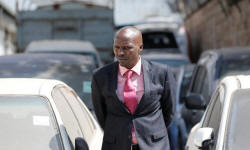Kenyan debtors struggle to hold on to assets as
repossessions rise
 Send a link to a friend
Send a link to a friend
 [October 03, 2017]
By Duncan Miriri [October 03, 2017]
By Duncan Miriri
NAIROBI (Reuters) - The Nairobi car
auctioneer hopefully scanned empty rows of rickety plastic chairs in a
dusty lot for more bids but saw only too many vehicles and not enough
buyers, an increasing problem as Kenya's economy slows and repossessions
pick up.
A severe drought earlier this year, a bank lending slowdown and
prolonged political uncertainty are creating a growing pool of
distressed borrowers whose assets are being seized by newly aggressive
lenders in the east African powerhouse.
George Muiruri, managing director of Leakey's auctioneers, says they are
holding 10 auctions a month, up from about four a year ago.
"Things are tight," Muiruri told Reuters as he prepared to auction
vehicles ranging from luxury cars to battered workhorses once owned by
painstakingly-built small businesses.

"Because of this political environment, people are postponing so many
plans," he said, adding: "You find that you repossess and then there are
no buyers."
Kenya's free market credentials, staunch alliances with Western nations
and relative stability in a region roiled by conflict has made it the
richest economy in East Africa and a favored regional headquarters for
global firms like Google, IBM and General Electric.
But growth slowed to five percent in the second quarter of this year,
below the official year's forecast of 5.5 percent, as a prolonged
election season took its toll.
Kenya held presidential, parliamentary and local elections on Aug. 8,
but a Supreme Court ruling on Sept. 1 annulled President Uhuru
Kenyatta's re-election and ordered a fresh contest, now scheduled for
Oct. 26.
Now even that date is in doubt; opposition leader Raila Odinga says he
will not participate unless the election board fires officials that he
blames for irregularities in August polls.
Many businesses want elections over before investing further, mindful of
the weeks of post-election violence that followed the disputed 2007
presidential poll, killing around 1,200 people and plunging the economy
into a nose-dive.
"People stopped investing in real estate or businesses waiting to see
the outcome of the election ... There are delays in payments from end to
end," said a bank CEO, who did not wish to be named.

[to top of second column] |

Auctioneer George Muiruri, inspects vehicles before their auction at
the Leakey's auctioneers yard in Nairobi, Kenya September 29, 2017.
REUTERS/Thomas Mukoya

SMALL BUSINESSES HIT
Those delays are choking John Wambua's small business transporting
plastic water tanks to retailers. His clients haven't paid for three
months so he has been unable to service the loan on his truck.
"We have had a big challenge due to the election. The people we
transport the water tanks for are not selling and so we have no work,"
he said wearily at the auction yard, where he had gone to beg for more
time before his truck is auctioned.
His story is common: there is a glut of repossessed vehicles, land,
homes and office equipment being sold off cheaply across Kenya.
At Leakey's, which also operates three separate storage yards around
Nairobi, the number of vehicles stored awaiting sale doubled to 1,500 in
the past year, Muiruri said.
Bank credit, formerly easily available, has dried up after the
government capped commercial lending rates last year, leaving lenders
unable to refinance seized assets.
Non-performing loans in the banking industry rose to 10.7 percent in
August, from 9.9 percent in June, the central bank said, jumping into
double digits for the first time since 2007.
Felix Apollo, chairman of the Association of Auctioneers, said banks
were moving much faster to seize property from defaulters since the cap
was put into place. There was a glut on the market of repossessed
assets, he said.

"The banks have become more aggressive," he said, noting one person was
killed in a fight to repossess a vehicle a couple of months ago.
But the economy retains stable macroeconomic fundamentals like slow
inflation and a stable foreign exchange rate, leading Apollo to believe
seizures will ease next year.
"Probably after the elections, people will go back to their normal
status," he said.
(Editing by Katharine Houreld and Peter Millership)
[© 2017 Thomson Reuters. All rights
reserved.] Copyright 2017 Reuters. All rights reserved. This material may not be published,
broadcast, rewritten or redistributed. |